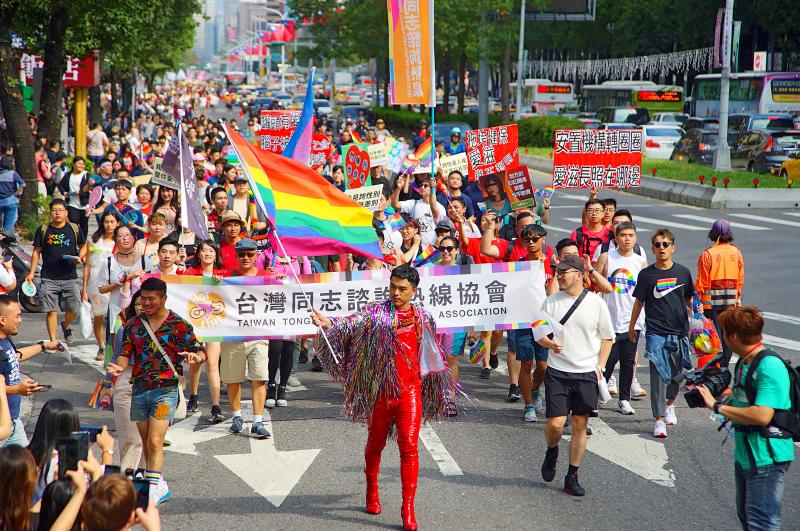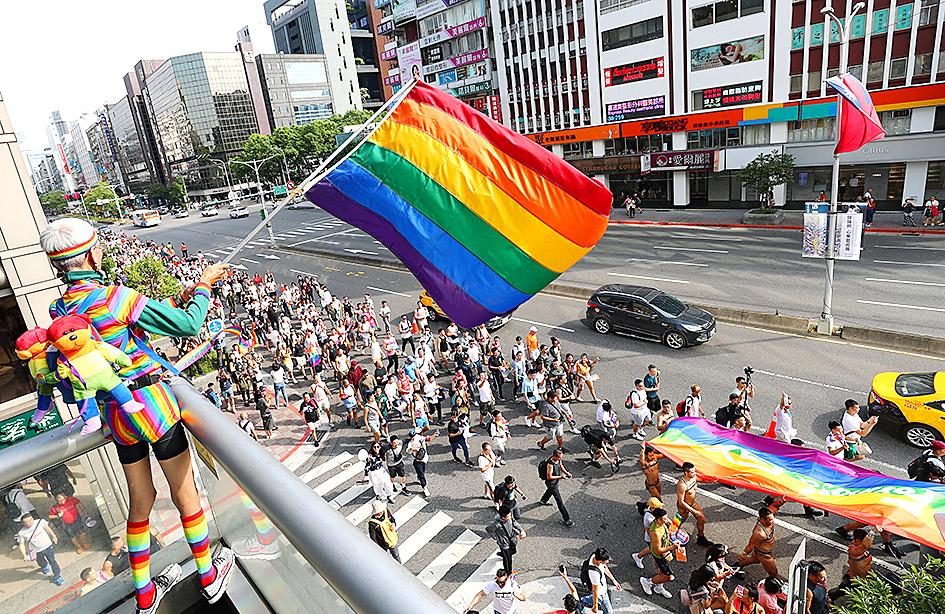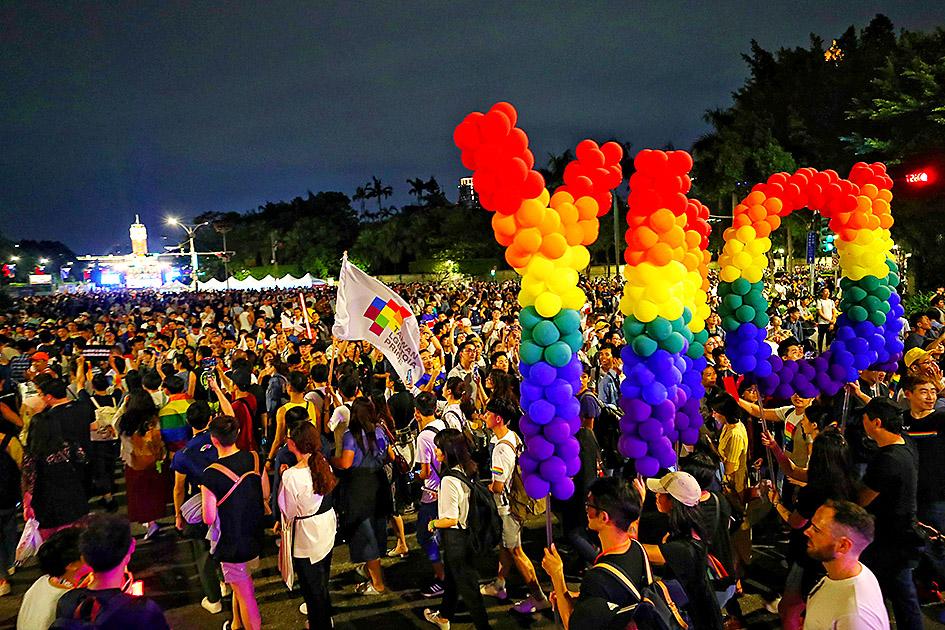Taiwan’s LGBT Pride Parade turns 18 this year.
The movement has come a long way from just wanting to be noticed in 2003 to reaching the milestone of same-sex marriage legalization in 2018, but like humans, coming of age is a major point of departure in one’s life journey.
Taiwan Rainbow Civil Action Association chairperson and parade spokesperson Shao Li-yi (邵立宜) says she is still asked whether a march is needed in this “post same-sex marriage era.”

Photo: CNA
She suggests looking at the 12 co-organizing groups — each one is still working on important issues, from removing HIV stigmas to parents supporting LGBTQ education to assisted sexual relief for disabled people and promoting workplace equality. Even same-sex marriage is far from equal, as issues regarding transnational marriage and adoption are yet to be resolved.
“Even though same-sex marriage has been legalized, these groups have not disappeared,” Shao says. “Neither have the radical anti-LGBTQ groups.”
These issues are all important, but most of all, this year’s parade calls for acceptance and respect toward those who are different, so that everyone can feel encouraged and comfortable to present themselves however they feel fit. The theme of this year’s parade, which begins at 1pm tomorrow at Taipei’s City Hall Plaza, is “Beauty, My Own Way.”

Photos: CNA
“We should be happy that we live in a diverse society — and that includes gender,” Shao says. “Besides feeling comfortable ourselves, we should help other people feel that way too.”
This identity extends to physical beauty as well, which is a problem both inside and outside the LGTBQ community. While beauty standards — especially toward women — are become increasingly homogenized, Shao says there’s also pressure within the gay community, for example, to fit into certain body categories.
Some ask why the LGBTQ community must encompass so many different identities, but according to the parade’s manifesto, this question is problematic since it essentially invalidates how people feel about themselves.

Photo: CNA
“This question confuses the concept of an ‘identity’ with the concept of ‘label,’” it states. “While a label is what we assign to other people, identity is a sense of belonging we grant ourselves ... Nobody can ‘help’ another person decide their identity. Each of us has the right to define what is normal to us based on what is most comfortable to us.”
Shao stresses that this identity can be fluid.
“If three years later I want to grow my hair out and act more feminine, that should be totally fine too,” she says.
Finally, Shao hopes that the parade — which will be livestreamed — can serve as inspiration and comfort for those in countries where parades cannot be held due to COVID-19 as well as those who are suffering from various problems due to being under lockdown.
“We want everyone to know that we are here with you, and you are welcome to join us online,” she says.

In the March 9 edition of the Taipei Times a piece by Ninon Godefroy ran with the headine “The quiet, gentle rhythm of Taiwan.” It started with the line “Taiwan is a small, humble place. There is no Eiffel Tower, no pyramids — no singular attraction that draws the world’s attention.” I laughed out loud at that. This was out of no disrespect for the author or the piece, which made some interesting analogies and good points about how both Din Tai Fung’s and Taiwan Semiconductor Manufacturing Co’s (TSMC, 台積電) meticulous attention to detail and quality are not quite up to

April 21 to April 27 Hsieh Er’s (謝娥) political fortunes were rising fast after she got out of jail and joined the Chinese Nationalist Party (KMT) in December 1945. Not only did she hold key positions in various committees, she was elected the only woman on the Taipei City Council and headed to Nanjing in 1946 as the sole Taiwanese female representative to the National Constituent Assembly. With the support of first lady Soong May-ling (宋美齡), she started the Taipei Women’s Association and Taiwan Provincial Women’s Association, where she

Chinese Nationalist Party (KMT) Chairman Eric Chu (朱立倫) hatched a bold plan to charge forward and seize the initiative when he held a protest in front of the Taipei City Prosecutors’ Office. Though risky, because illegal, its success would help tackle at least six problems facing both himself and the KMT. What he did not see coming was Taipei Mayor Chiang Wan-an (將萬安) tripping him up out of the gate. In spite of Chu being the most consequential and successful KMT chairman since the early 2010s — arguably saving the party from financial ruin and restoring its electoral viability —

It is one of the more remarkable facts of Taiwan history that it was never occupied or claimed by any of the numerous kingdoms of southern China — Han or otherwise — that lay just across the water from it. None of their brilliant ministers ever discovered that Taiwan was a “core interest” of the state whose annexation was “inevitable.” As Paul Kua notes in an excellent monograph laying out how the Portuguese gave Taiwan the name “Formosa,” the first Europeans to express an interest in occupying Taiwan were the Spanish. Tonio Andrade in his seminal work, How Taiwan Became Chinese,